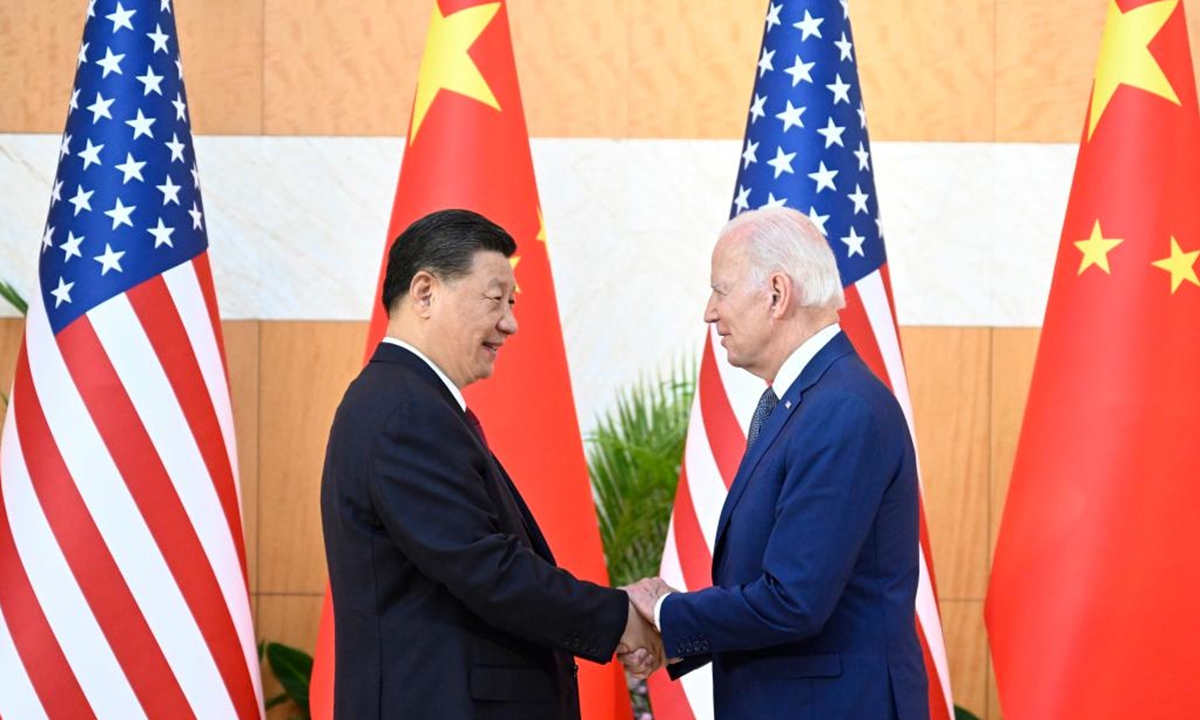Global Times editorial (15 November 2022) – On Monday afternoon local time, Chinese President Xi Jinping had a meeting with US President Joe Biden in Bali, Indonesia. The scene of the two leaders shaking hands and smiling before the official meeting was sensitively captured by the global media and quickly spread around the world via internet. This long-awaited scene between China and the US has timely relaxed and comforted the world’s tense emotions amid various crises and challenges. And it will be freeze-framed in a crucial place in the history of China-US relations.
The international community generally expects China and the US to handle their relations well. This expectation is reflected in the international public opinion’s scrutiny of every detail of the meeting between the two leaders, and their hope to find positive signs from it. It can be seen that everyone’s feelings are similar. China-US relations have fallen to a low point since the establishment of diplomatic relations, and many people worry that China and the US will have a “new Cold War.” The severe consequences of a possible military conflict between China and the US have made the international community filled with concerns. Under such circumstances, the fact that the heads of state of China and the US can sit together and talk candidly is a positive signal to the outside world, whatever they have talked about. This is a general tone of international media reports on this meeting.
The meeting, which attracted worldwide attention, lasted 3 hours and 12 minutes. The two heads of state had a candid and in-depth exchange of views on strategic issues in China-US relations and major global and regional issues. Both sides expressed the basic willingness to engage in dialogue rather than confrontation, and win-win cooperation rather than zero-sum competition.
President Xi profoundly pointed out the three layers of common interests between China and the US. It is in our mutual and fundamental interest to prevent conflict and confrontation and achieve peaceful coexistence. It is in our mutual interest to benefit from each other’s development. It is also in our mutual interest to promote post-COVID global recovery, tackle climate change and resolve regional issues through China-US coordination and cooperation. “Under the current circumstances, China and the US share more, not less, common interests.”
Quite a few public opinions have noticed that the venue for this meeting is the Chinese delegation’s residence in Bali, and the hotel where the US delegation is staying is about 10 minutes’ drive away. Furthermore, this meeting was proposed by the US. In fact, it is not difficult to find that each time the continuous deterioration of China-US relations happens, it is due to the unilateral provocation by the US.
As the saying goes, “whoever starts the trouble should end it.” Only if the US takes the right attitude and practical actions can China-US relations return to the right track. During the meeting, US President Biden expanded the previous “Five Noes” commitment made by the US leadership (i.e. to not seek a new Cold War; to not seek to change China’s system; that the revitalization of its alliances won’t be against China; to not support “Taiwan independence”; to not look for conflict with China) and proposed that the US respects China’s system, and does not seek to change it; the US does not seek a new Cold War, does not seek to revitalize alliances against China, does not support “Taiwan independence,” does not support “two Chinas” or “one China, one Taiwan,” and has no intention to have a conflict with China; the US side has no intention to seek “decoupling” from China, to halt China’s economic development, or to contain China. We hope that the US can implement President Biden’s commitment instead of always saying one thing and doing another. This is both about sincerity and integrity.
China-US relations cannot deteriorate any further. In dealing with the huge and complicated bilateral relationship, it is impossible to solve all problems with just one meeting.
However, the meeting between the two heads of state in Bali showed that the two major powers still have many common views, thus providing more space and possibilities for the two sides to further properly manage divergences on specific issues and promote mutually beneficial cooperation.
During the meeting, the two heads of state instructed the working teams of the two sides to follow up and implement the important consensus reached in a timely manner, and take concrete actions to push China-US relations back to the track of stable development. This is undoubtedly worth expectation for the two countries and the world.
We hope that the conclusion of this meeting will become a new starting point for broader communication between China and the US, as well as a starting point for the two to seek pragmatic cooperation through communication. China maintains continuity and stability in its US policy, and has always called on the US to meet China halfway, which is not only in the fundamental interests of the two countries and the two peoples, but also the common expectation of the international community. The goal of handling China-US relations well should not only be to avoid conflicts.

